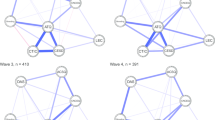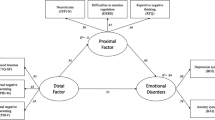Abstract
Vulnerability has increasingly become the organizing construct around which much research in psychopathology is organized. This is particularly the case for depression, where researchers have begun to focus considerable attention on the variables that may predispose some individuals to this disorder. Much of this attention has been directed toward understanding the origins of these presumed vulnerability processes. In line with this interest, vulnerability origins stemming from schema models, hopelessness models, and attachment theory are discussed, as is the idea of disrupted parent-child interactions in the creation of vulnerability. Within this latter category the link between abuse, maltreatment, cognitive factors andvulnerability is examined. Possible directions for future theory and research in cognitive vulnerability and depression are then discussed.
Similar content being viewed by others
References
Ainsworth, M. D. S. (1989). Attachments beyond infancy. American Psychologist, 44, 709–716.
Ainsworth, M. D. S., Blehar, M. C., Waters, E., & Wall, S. (1978). Patterns of attachment: A psychological study of the strange situation. Hillsdale, NJ: Erlbaum.
Akiskal, H. S. (1979). A biobehavioral approach to depression. In R. A. Depue (Ed.), The psychobiology of depressive disorders. New York: Academic Press.
Akiskal, H. S., & McKinney, W. T. (1973). Depressive disorders: Toward a unified hypothesis. Science, 182, 20–29.
Akiskal, H. S., & McKinney, W. T. (1975). Overview of recent research in depression: Integration of ten conceptual models into a comprehensive clinical frame. Archives of General Psychiatry, 32, 285–305.
Bartholomew, K., & Horowitz, L. M. (1991). Attachment styles among young adults: A test of a four-category model. Journal of Personality and Social Psychology, 61, 226–244.
Beck, A. T. (1967). Depression: Causes and treatment. Philadelphia: University of Pennsylvania Press.
Bemporad, J. R., & Romano, S. J. (1992). Childhood maltreatment and adult depression: A review of research. In D. Cicchetti & S. L. Toth (Eds.), Developmental perspectives on depression. Rochester, NY: University of Rochester Press. 351–375.
Blatt, S. J., Wein, S. J., Chevron, E., & Quinlan, D. M. (1979). Parental representations and depression in normal young adults. Journal of Abnormal Psychology, 88, 388–397.
Bowlby, J. (1969). Attachment and loss: Vol. 1. Attachment. New York: Basic Books.
Bowlby, J. (1973). Attachment and loss: Vol. 2. Separation, anxiety, and anger. New York: Basic Books.
Bowlby, J. (1980). Attachment and loss: Vol. 3. Loss: Sadness and depression. New York: Basic Books.
Bowlby, J. (1988). A secure base: Parent–child attachment and healthy human development. New York: Basic Books.
Brewin, C. R., Firth-Cozens, J., Furnham, A., & McManus, C. (1992). Self-criticism in adulthood and recalled childhood experience. Journal of Abnormal Psychology, 101, 561–566.
Cole, D. A., Jacquez, F. M., & Maschman, T. L. (2001). Social origins of depressive cognitions: A longitudinal study of self-perceived competence in children. Cognitive Therapy and Research, 25, 377–396.
Cooley, C. H. (1902). Human nature and the social order. New York: Scribner.
Cummings, E. M., & Cicchetti, D. (1990). Toward a transactional model of relations between attachment and depression. In M. Greenberg & D. Cicchetti (Eds.), Attachment in the preschool years: Theory research, and intervention. Chicago: University of Chicago Press. 170–188.
Doane, J. A., & Diamond, D. (1994). Affect and attachment in the family: A family based treatment of major psychiatric disorder. New York: Basic Books.
Garber, J., & Flynn, C. (2001). Predictors of depressive cognitions in young adolescents. Cognitive Therapy and Research, 25, 353–376.
Gerlsman, C., Emmelkamp, P. M. G., & Arrindell, W. A. (1990). Anxiety, depression, and perception of early parenting: A meta-analysis. Clinical Psychology Review, 10, 251–277.
Goodman, S. H., & Gotlib, I. H. (1999). Risk for psychopathology in the children of depressed mothers: A developmental model for understanding mechanisms of transmission. Psychological Review, 106, 458–490.
Hammen, C. (1991a). Depression runs in families: The social context of risk and resilience in children of depressed mothers. New York: Springer.
Hammen, C. (1991b). The generation of stress in the course of unipolar depression. Journal of Abnormal Psychology, 100, 555–561.
Hammen, C., & Zupan, B. A. (1984). Self-schemas and the processing of personal information in children. Journal of Experimental Child Psychology, 37, 598–608.
Ingram, R. E., Miranda, J., & Segal, Z. V. (1998). Cognitive vulnerability to depression. New York: Guilford Press.
Ingram, R. E. (2001). Developing perspectives on the cognitive-developmental origins of Depression: Back is the future. Congnitive Therapy and Research, 25, 497–504.
Ingram, R. E., Overbey, T., & Fortier, M. (2001). Individual differences in dysfunctional automatic thinking and parental bonding: Specificity of maternal care. Personality and Individual Differences, 30, 401–412.
Ingram, R. E., & Price, J. M. (2001). The role of vulnerability in understanding psychopathology. In R. E. Ingram & J. M. Price (Eds.), Vulnerability to psychopathology: Risk across the lifespan (pp. 3–19). New York: Guilford Press.
Ingram, R. E., & Ritter, J. (2000). Vulnerability to depression: Cognitive reactivity and parental bonding in high-risk individuals. Journal of Abnormal Psychology, 109, 588–596.
Jaenicke, C., Hammen, C. L., Zupan, B., Hiroto, D., Gordon, D., Adrain, C., et al. (1987). Cognitive vulnerability in children at risk for depression. Journal of Abnormal Child Psychology, 15, 559–572.
Jordan, A., & Cole, D. A. (1996). Relation of depressive symptoms to the structure of self-knowledge in childhood. Journal of Abnormal Psychology, 105, 530–540.
Kuyken, W., & Brewin, C. R. (1995). Autobiographical memory functioning in depression and reports of early abuse. Journal of Abnormal Psychology, 104, 585–591.
LeDoux, J. E. (1996). The emotional brain: The mysterious underpinnings of emotional life. New York: Simon & Schuster.
Manian, N., Strauman, T., & Denney, N. (1998). Temperament, recalled parenting styles, and self-regulation: Testing the developmental postulates of self-discrepancy theory. Journal of Personality and Social Psychology, 75, 1321–1332.
McCranie, E. W., & Bass, J. D. (1984). Childhood family antecedents of dependency and self-criticism: Implications for depression. Journal of Abnormal Psychology, 93, 3–8.
Mead, G. H. (1934). Mind, self, and society. Chicago: University of Chicago Press.
Parker, G. (1979). Parental characteristics in relation to depressive disorders. British Journal of Psychiatry, 134, 138–147.
Parker, G. (1983). Parental “affectionless control” as an antecedent to adult depression: A risk factor delineated. Archives of General Psychiatry, 40, 956–960.
Radke-Yarrow, M., Belmont, B., Nottelmann, E. D., & Bottomly, L. (1990). Young children's self-conceptions: Origins in the natural discourse of depressed mothers and their children. In D. Cicchetti & M. Beeghly (Eds.), The self in transition: Infancy to childhood (pp. 345–361). Chicago: University of Chicago Press. (The John D. and Catherine T. MacArthur foundation series on mental health and development.)
Ricks, M. (1985). The social transmission of parental: Attachment across generations. Monographs of the Society for Research in Child Development, 50(1–2, Serial No. 209), 445–466.
Roberts, J. E., Gotlib, I. H., & Kassel, J. D. (1996). Adult attachment security and symptoms of depression: The mediating roles of dysfunctional attitudes and low self-esteem. Journal of Personality and Social Psychology, 70, 310–320.
Rogers, T. B., Kuiper, N. A., & Kirker, W. S. (1997). Self-reference and the encoding of personal information. Journal of Personality and Social Psychology, 35, 677–688.
Rose, D. T., & Abramson, L. Y. (1992). Developmental predictors of depressive cognitive style: Research and theory. In D. Cicchetti & S. L. Toth (Eds.), Developmental perspectives on depression (pp. 323–350). Rochester, NY: University of Rochester Press.
Rose, D. T., & Abramson, L. Y. (1995). Developmental maltreatment and cognitive vulnerability to hopelessness depression. Paper presented at the meeting of the Association for the Advancement of Behavior Therapy, Washington, DC.
Rose, D. T., Abramson, L. Y., Hodulik, C. J., Halberstadt, L., & Leff, G. (1994). Heterogeneity of cognitive style among depressed inpatients. Journal of Abnormal Psychology, 103, 419–429.
Rudolph, K. D., Kurlakowsky, K. D., & Conley, C. S. (2001). Developmental and social–contextual origins of depressive control-related beliefs and behavior. Cognitive Therapy and Research, 25, 447–476.
Taylor, L., & Ingram, R. E. (1999). Cognitive reactivity and depressotypic information processing in the children of depressed mothers. Journal of Abnormal Psychology, 108, 202–210.
Teasdale, J. D. (1988). Cognitive vulnerability to persistent depression. Cognition and Emotion, 2, 247–274.
Whisman, M. A., & Kwon, P. (1992). Parental representations, cognitive distortions, and mild depression. Cognitive Therapy and Research, 16, 557–568.
Whisman, M. A., & McGarvey, A. L. (1995). Attachment, depressotypic cognitions, and dysphoria. Cognitive Therapy and Research, 19, 633–650.
Williams, S., Connolly, J., & Segal, Z. V. (2001). Intimacy in relationships and cognitive vulnerability to depression in adolescent girls. Cognitive Therapy and Research, 25, 477–496.
Author information
Authors and Affiliations
Rights and permissions
About this article
Cite this article
Ingram, R.E. Origins of Cognitive Vulnerability to Depression. Cognitive Therapy and Research 27, 77–88 (2003). https://doi.org/10.1023/A:1022590730752
Issue Date:
DOI: https://doi.org/10.1023/A:1022590730752




